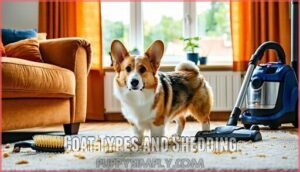This site is supported by our readers. We may earn a commission, at no cost to you, if you purchase through links.

That leaves many apartment dwellers wondering if all that personality can thrive in a smaller space. Are corgis good apartment dogs? There’s more to the answer than a wagging tail—think exercise hacks, clever routines, and the unique joys (and quirks) that only a corgi brings.
Table Of Contents
- Key Takeaways
- Are Corgis Good Apartment Dogs?
- What Does a Corgi Look Like?
- What is a Corgi’s Temperament?
- How Much Exercise Do Corgis Need?
- Are Corgis Noisy Neighbors?
- Do Corgis Shed a Lot?
- What Health Issues Affect Corgis?
- How Easy Are Corgis to Train?
- Key Considerations for Apartment Living
- Preparing Your Corgi for Apartment Life
- Frequently Asked Questions (FAQs)
- What commands are most important to teach an apartment-dwelling corgi?
- How can I find pet-friendly apartments in my area?
- Can Corgis be left alone during work hours?
- How do Corgis handle apartment elevators and stairs?
- Are Corgis suitable for first-time dog owners?
- What insurance or deposits do apartments require for Corgis?
- Do Corgis get along with other pets in apartments?
- Conclusion
Key Takeaways
- Corgis can thrive in apartments if you give them daily exercise, mental stimulation, and a set routine.
- Their small size fits most pet policies, but expect heavy shedding and daily grooming.
- Noise can be a challenge with their barking, so early training and activity help keep it down.
- Corgis are loving, social dogs that need plenty of family time and can’t be left alone for long stretches.
Are Corgis Good Apartment Dogs?
If you’re wondering whether a Corgi can thrive in your apartment, you’re not alone—it’s one of the most common questions prospective owners ask. The answer depends on three key factors that determine apartment suitability.
Let’s look at what really matters when bringing a Corgi into a smaller living space.
Corgi Size and Apartment Suitability
When you’re living in a city where closet space costs more per square foot than your neighbor’s parking spot, a Corgi’s compact size might just be your golden ticket to dog ownership. At 10-12 inches tall and 25-30 pounds, Pembroke Welsh Corgis slip under most apartment weight restrictions without breaking a sweat.
In fact, 89% of apartments with pet policies give these small dog breeds the green light, making them genuinely family-friendly dogs for urban dwellers who want big personality in a manageable package.
Exercise Needs in Small Spaces
Here’s the reality: your Corgi needs 1–2 hours of daily exercise to stay healthy and happy. That’s where things get interesting in a 600-square-foot apartment. Indoor activities like fetch, puzzle toys, and weaving through furniture can work wonders for mental stimulation.
Over 59% of owners blend outdoor walks with creative indoor play sessions. Mix it up—dog sports, training drills, and activity variety keep your active dog from turning your couch into confetti. Corgis also need consistent mental stimulation to prevent boredom.
Corgi Adaptability to Urban Living
Corgis rank in the top 20% of adaptable breeds for city living—but their success in your studio depends on more than just size. Urban socialization helps your Corgi adjust to elevators, sirens, and bustling sidewalks. Noise adaptation training curbs reactive barking at doorbell rings.
Space optimization matters—use vertical storage for toys and create cozy corners. Exercise alternatives like indoor agility or hallway fetch supplement outdoor walks.
Their breed popularity means you’ll find Corgi-friendly dog parks and training classes nearby.
What Does a Corgi Look Like?
Corgis have a look that’s hard to mistake—short legs, long bodies, and those big, expressive ears that seem to catch everything. Their compact build and thick coat give them a sturdy appearance that’s equal parts adorable and surprisingly athletic.
Here’s what you can expect when you’re sizing up whether a Corgi fits your apartment life.
Size and Weight Range
If you’re wondering whether your couch will fit both you and your Corgi, don’t worry—these pint-sized pups pack a lot of personality into a surprisingly compact frame. Most Corgis stand just 10-12 inches tall and weigh between 25-30 pounds, meeting breed standard guidelines.
Their sturdy build makes weight management essential throughout growth stages to prevent joint issues and maintain ideal weight for this dog breed’s unique body structure.
Coat Types and Shedding
Your living room might look clean, but wait until you meet a Corgi—these dogs turn shedding into a full-time job. Both Pembroke and Cardigan Corgis sport a double coat that sheds year-round, ramping up during spring and fall.
You’ll need quality grooming tools and a solid vacuum. Regular brushing helps manage the fur explosion, though Corgis aren’t hypoallergenic—allergy management becomes essential for sensitive owners.
Colors and Distinguishing Features
Walk through any dog park and you’ll spot the telltale signs—stumpy legs, fox-like face, and a coat that catches light like copper in sunset. Pembroke Welsh Corgis showcase red, sable, fawn, and black-and-tan coat coloration, while Cardigans add brindle and blue merle variations into the mix.
Breed differences include tail length—Pembrokes sport natural bobs, Cardigans keep their full tails—making identification straightforward once you know these unique markings.
What is a Corgi’s Temperament?
If you’ve ever watched a Corgi in action, you know they’re more than just adorable—they’ve got strong opinions and big personalities packed into those short legs. Understanding your Corgi’s temperament is key to creating a peaceful apartment setup, especially when quirks like herding instincts or barking habits show up unexpectedly.
Let’s break down what makes these dogs tick and how their nature translates to everyday apartment life.
Personality Traits
Think of Corgis as friendly extroverts—they’re brimming with loyalty, intelligence, and playfulness that makes them truly special companions. Their affection runs deep, often following you room to room like a furry shadow.
Their adaptability shines in apartment settings, though their herding instincts might kick in during playtime. This Corgi temperament combines eager-to-please smarts with occasional stubbornness, creating an intelligent dog that thrives on family bonding and mental challenges. They’re known for their confident and outgoing personalities.
Behavioral Quirks in Apartments
Corgis in apartments can surprise you—their herding heritage means they might try to "manage" everything from your slippers to visiting guests, and those short legs hide a surprisingly bold personality. Without proper dog training, you might notice attention-seeking behaviors like pawing or nudging when they want playtime. Separation anxiety can trigger destructive chewing or digging indoors when they’re left alone too long.
Watch for these behavioral issues:
- Resource guarding around food bowls or favorite toys—early training prevents this
- Excessive barking at hallway sounds or neighbors—typical herding dog behavior
- Nipping at ankles during excited play—their instinct to herd needs redirecting
Social Needs and Family Bonding
These little dogs don’t just want to be around people—they practically consider themselves full-time members of your household committee, weighing in on everything from dinner prep to movie choices.
Family integration comes naturally—Corgis thrive as companion dogs when they’re included in daily routines, from morning coffee to evening walks.
Early socialization importance can’t be overstated; bonding activities like training sessions strengthen their role as loyal dogs while providing emotional support for everyone involved.
How Much Exercise Do Corgis Need?
Corgis aren’t couch potatoes—they’re working dogs bred to herd cattle, so they need regular movement to stay happy and healthy. Without enough exercise, you’ll likely see unwanted behaviors like excessive barking or chewing.
Let’s break down what your Corgi needs to thrive in your apartment.
Daily Activity Requirements
As a general rule, adult Corgis need about 60 minutes of physical exercise per day to stay healthy and happy. Breaking that hour into two or three shorter walks helps prevent boredom and keeps your pup mentally stimulated.
Regular exercise isn’t just about burning energy—it’s essential Corgi training, too. Activity variety matters: mix neighborhood strolls with indoor games to challenge both body and mind.
Indoor Vs. Outdoor Play
When apartment life limits backyard romps, smart owners balance both indoor and outdoor play to keep their Corgi’s mind and body sharp. Outdoor walks provide essential Corgi exercise and socialization, while indoor activities offer weather alternatives when it’s too hot or cold. Despite space limitations, your Corgi thrives with a consistent playtime schedule that includes mental stimulation through puzzle toys and agility training like hallway weaving. Toy variety prevents boredom—rotate between fetch, tug, and brain games. Regular exercise needs both settings to keep your pup fulfilled.
- Outdoor: Morning and evening walks for socialization and physical activity
- Indoor: Puzzle toys, hide-and-seek, and hallway fetch for rainy days
- Mix it up: Alternate activities to maintain interest and engagement
Tips for Meeting Exercise Needs in Apartments
Meeting your Corgi’s exercise goals in a compact space takes creativity, but a few smart strategies turn your apartment into an active lifestyle hub. Set up indoor agility courses with cones for weaving, incorporate stair workouts for cardio, and rotate puzzle toys for mental stimulation.
Schedule playdates with other dogs at nearby parks to satisfy social needs. Some owners find treadmill training useful for rainy days, though it requires gradual introduction and supervision to keep dog exercise safe and effective.
Are Corgis Noisy Neighbors?
Let’s be honest—Corgis aren’t exactly the quiet type. Their herding background means they’re wired to communicate, and that often translates to barking at passersby, doorbells, or even the neighbor’s cat.
Here’s what you need to know about managing noise levels with your apartment Corgi.
Barking Tendencies
Ever noticed how quickly your pup alerts you to the tiniest sound outside? Barking is woven into Corgi breed standards and animal behavior—they’re naturally vocal watchdogs, not shy about chiming in. Expect these dog training and behavior patterns:
- Burst “alert” barking at doors
- Excited vocalization with guests
- Calls for attention, especially alone
- Barking triggers include passing pets, delivery vans, or strange noises
Managing Excessive Noise
Sometimes it feels like your Corgi is running the neighborhood news desk—so let’s talk about how you can keep things a little quieter around the house.
Address barking triggers with Dog Training techniques, noise desensitization, or gentle obedience training. Sprinkle in some soundproofing options for peace of mind, all while respecting your Corgi’s natural vocalization needs and animal behavior instincts.
Tips for a Quiet Corgi
If you’ve ever wished your Corgi’s bark came with an off switch, you’re in good company. Try these real-world solutions for a quieter home:
- Bark training and obedience tips from Dog Training and Behavior experts
- Prioritize daily exercise—Corgi temperament thrives with movement
- Rotate puzzle toys and calming aids to bust boredom
- Apply smart soundproofing tips for sensitive ears
Do Corgis Shed a Lot?
If you’re wondering about Corgis and shedding, you’re not alone. These lovable pups definitely have their own hair habits.
Here’s what you should know before you get out the vacuum.
Shedding Patterns and Triggers
Living with a Corgi is a bit like owning a tiny, four-legged snow machine—one minute your floors are clean, and the next you’re wondering where all that fur came from. That’s because Corgis have serious “Coat Blow” sessions, especially during seasonal shedding.
Their diet, stress levels, and overall Corgi care all play a part, so stay watchful!
Grooming Routines for Apartments
With a Corgi shedding up a storm, keeping up with grooming at home makes your place a lot more comfortable for everyone. Brush your pup two to three times a week for real shedding control. Try a handheld vacuum—your best friend after a Corgi’s coat blow.
Schedule baths monthly, trim nails regularly, and see professional groomers for deep-clean dog grooming and hygiene.
Reducing Allergens Indoors
You’d be surprised how much cleaner the air feels when you tackle pet allergens head-on. Staying ahead of shed with smart pet care can make life easier:
- Use HEPA Air Purifiers for daily dust.
- Frequent Cleaning—think mops and vacuums.
- Add Allergen Barriers to bedding.
- Bathe regularly for dog grooming and care.
- Consider Diet Impact for healthier coats.
What Health Issues Affect Corgis?
Every Corgi has its own quirks, and that goes for their health, too. If you’re curious about what might come up along the way, it’s good to know the most common concerns.
Here’s what you should look out for as a Corgi owner.
Common Genetic Disorders
Ask anyone who’s faced the heartbreak of genetic disorders in Corgis—IVDD risk, hip dysplasia, and degenerative myelopathy aren’t rare guests. These conditions sneak into even the happiest homes. That’s why vWD screening and good canine genetics know-how matter for Corgi health.
Here’s how these challenges can steal comfort from your loyal companion:
| Disorder | What It Means | Why It Hurts |
|---|---|---|
| IVDD | Spinal cord compression | Pain/Loss of mobility |
| Hip Dysplasia | Bad hip socket formation | Arthritis, limp |
| Degenerative Myelopathy | Nerve cell degeneration | Rear limb weakness |
Preventative Health Care
Keeping your Corgi healthy isn’t just about luck—it’s about everyday choices that stack up like treats in a jar. Stay on top of vaccination schedules and parasite prevention to keep those sneaky bugs away.
Add in regular dental hygiene, mindful weight management, and genetic screening, and you’ve set the stage for solid Corgi health and long-term pet wellness, right at home.
Lifespan and Wellness Tips
Pair everyday preventative care with a sharp eye on genetic predispositions, and you’ll help your Corgi land in that happy lifespan prime range—on average 12 to 15 years.
Prioritize diet considerations, regular Corgi exercise, and mental stimulation.
Staying proactive with pet care and learning the ropes of common Corgi health issues can add years to your little shadow’s sidekick time.
How Easy Are Corgis to Train?
Corgis tend to be quick studies, but they’ve their own ideas about how things should go. Training can be both fun and a little challenging, depending on your dog’s mood.
Here’s what you’ll want to focus on as you start working together.
Obedience and Socialization
From puppyhood, a Corgi’s sharp mind makes obedience training and early socialization a breeze. These intelligent dogs respond best to positive training methods—think treats and cheerful praise.
With consistent routines and short, daily sessions, you’ll sidestep most behavioral problems. Apartment strategies like busywork toys and quick training bursts keep their brains engaged, even on rainy days.
Managing Herding Behavior
If your Corgi suddenly starts herding socks or steering the family down the hallway, you’re not alone—those quirky instincts love to pop up in apartment life. Here’s how to keep it in check:
- Redirect with breed-specific toys
- Practice obedience training daily
- Use positive Training Techniques
- Offer mental stimulation
- Prioritize Apartment Safety and supervised play
Training Tips for Apartment Life
Taming those playful herding bursts is half the battle—next, let’s look at how you can make training work right in your apartment. Corgis are intelligent dogs, so focus on mixing quiet games with leash manners, potty training, and bark control. Don’t forget socialization skills; neighbors love a polite pup!
| Focus Area | Training Tip |
|---|---|
| Potty Training | Schedule frequent breaks, use praise |
| Bark Control | “Quiet” command and rewards |
| Leash Manners | Practice short indoor walks |
| Socialization Skills | Greet neighbors calmly |
| Quiet Games | Puzzle toys for mental stimulation |
Key Considerations for Apartment Living
Living with a Corgi in an apartment calls for a little planning and flexibility. A few key factors can make daily life easier for both you and your dog.
Let’s look at what matters most in these close quarters.
Space Requirements
It’s remarkable how quickly a small apartment can feel even smaller when your dog thinks every corner is their kingdom. Corgis thrive with clever apartment size solutions like adaptable furniture, vertical space for toys, and cozy nooks for comfort.
Smart toy storage isn’t just tidy—it encourages exercise, benefits Corgi health, and makes daily dog care feel more manageable for everyone.
Access to Outdoor Areas
When you’re apartment living, a patch of grass just steps away can feel like a little slice of dog heaven. Corgi exercise and regular potty breaks come easier with reliable Park Access or a safe balcony spot.
Think outdoor socialization, practicing leash manners, and meeting exercise needs. Even a brisk stroll helps your Corgi dog stay healthy—and you’ll both enjoy the fresh air.
Apartment Pet Policies
A good lease can sound friendlier than your landlord on pet move-in day. Before dreaming up Corgi zoomies, know what policies you’re up against:
- Breed Restrictions often rule out more breeds than you’d expect.
- Weight Limits keep watch on your dog’s scale.
- Pet Deposits and monthly Pet Rent add up.
- Policy Enforcement makes responsible pet ownership essential.
Preparing Your Corgi for Apartment Life
Getting your Corgi comfortable in an apartment starts with a little planning. Before you welcome your pup home, it’s smart to think about what they’ll need.
Here are a few simple ideas to help you set up their space.
Setting Up a Dog-Friendly Space
Every dog deserves a cozy corner to call their own, and your Corgi is no different. Carve out Safe Zones with plush Cozy Bedding, offer easy Toy Storage, and set up Scratching Posts—even if most Corgis prefer a chew session.
Potty Training supplies should be handy. This thoughtful setup aids your Corgi’s exercise, health, and overall comfort in apartment living.
Establishing Routines
You know how your day just flows better when you have a set schedule? Well, your Corgi feels the same way. Feeding Schedules, regular Potty Breaks, and Playtime Consistency help your dog anticipate what’s next.
Set clear Training Times and Socialization Windows, weaving in Corgi Exercise and Grooming for true dog care and maintenance. Consistency builds trust—and a calmer home.
Enrichment and Mental Stimulation
Ever wonder why your Corgi stares at you like they’re about to solve a mystery? Their little minds are busy, and they need just as much mental exercise as they do physical. Try:
- Puzzle toys and scent work for creative outlets.
- Training games—Corgis are intelligent dog breeds who love challenges.
- Social interaction—mix up routines for true Corgi enrichment.
Frequently Asked Questions (FAQs)
What commands are most important to teach an apartment-dwelling corgi?
Teaching your corgi Quiet command, solid Recall training, and reliable Potty training makes life smoother indoors.
Add Leash manners and Socialization skills, and you help these intelligent dogs thrive as friendly, well-behaved family pets.
How can I find pet-friendly apartments in my area?
Start with an online search for pet-friendly apartments and check local resources or neighborhood forums. Look out for breed restrictions, review the application process, and gather landlord references that highlight your pet care and ownership experience.
Can Corgis be left alone during work hours?
Ever found your heart dropping as you turn the key, knowing your Corgi’s waiting? The Corgi breed’s strong social streak makes Separation Anxiety common—plan Boredom Busters, crate training, Dog Walkers, and timely Potty Breaks for smooth pet care.
How do Corgis handle apartment elevators and stairs?
Short legs and long backs mean Corgis need stair safety training early to avoid joint health issues like hip dysplasia and back problems.
Use training strategies and elevator etiquette—especially with puppies—to protect against common Corgi health issues.
Are Corgis suitable for first-time dog owners?
Corgis can work for first-time dog owners who embrace consistent training and are ready for an exercise commitment.
Be mindful of grooming needs, temperament challenges, and health awareness—responsible pet ownership hinges on understanding Corgi breed information and care.
What insurance or deposits do apartments require for Corgis?
Around 78% of apartments require a pet deposit or monthly pet rent for Corgis, often between $200–$500, along with renters insurance or liability coverage.
Breed restrictions and damage waivers may apply, reflecting the commitment to responsible pet ownership.
Do Corgis get along with other pets in apartments?
Pairing a Corgi with other pets? Focus on Corgi socialization and educating your companion animals about boundaries.
With the right steps—careful introducing pets, monitoring for resource guarding—you can enjoy multi-pet harmony among these family-friendly dogs.
Conclusion
Imagine a quiet morning in your cozy apartment—the sunlight slanting in, a corgi’s paws already keen for action. That blend of bounce and cuddly calm is what makes corgis good apartment dogs—if you’re ready for their quirks and bursts of energy.
With a little daily planning, shedding becomes manageable, barks are tamed, and those soulful eyes remind you that small spaces can hold immense joy. Every day feels brighter with a corgi at your side.
- https://community.cadca.org/blogs/jeff-wellington1/2021/03/05/can-i-keep-a-corgi-puppy-in-my-apartment
- https://articles.hepper.com/are-corgis-good-apartment-dogs/
- https://www.apartments.com/blog/adopting-a-dog-choosing-the-best-apartment-friendly-breeds
- https://dogell.com/en/dog-breed/pembroke-welsh-corgi
- https://www.dogster.com/dog-health-care/how-much-exercise-does-my-corgi-need

















